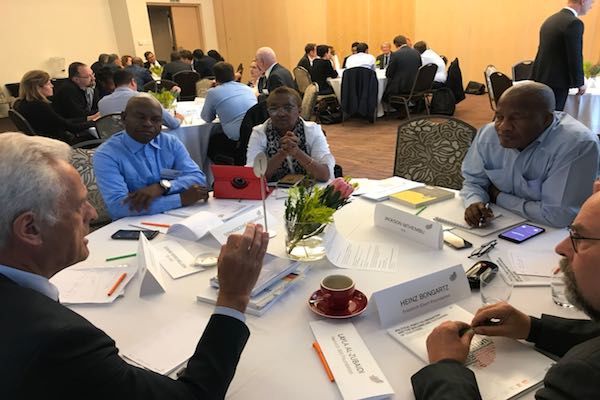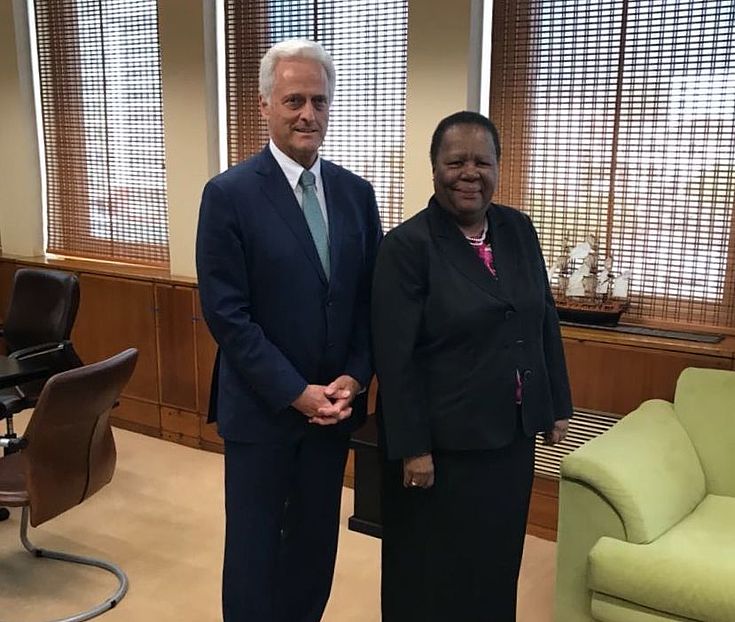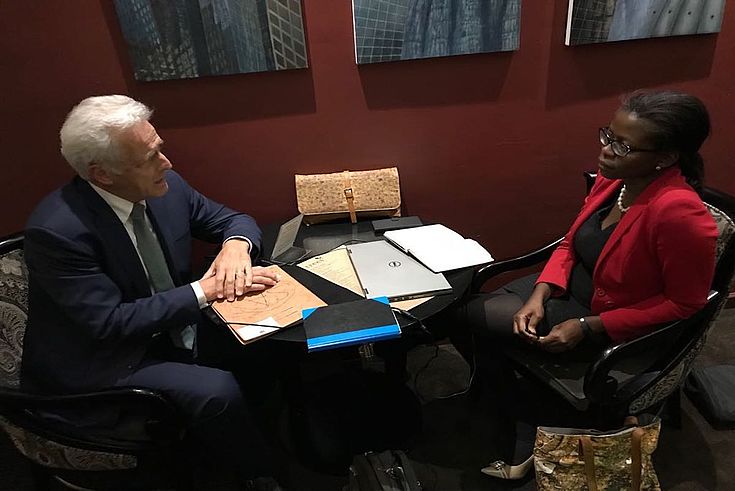Chairman of Bundestag committee visits Cape Town
Dr Peter Ramsauer discusses building of political coalitions and learns more about South Africa's challenges in the economy and education

Talking about the necessity of compromise in politics, with ANC chief whip, Jackson Mthembu
HSF
Stronger together - Coalitions could help to unite a nation divided
As one of six political leaders from across the German political landscape, the former German Federal Minister for Transport, Building and Urban Development, Dr Peter Ramsauer, from the Christian Social Union (CSU), who currently chairs the Committee on Economic Cooperation & Development in the German Bundestag, took part in symposium on political party cooperation and the building of coalitions, held in Cape Town on 7th May.
This high-level exchange between South African and German political leaders saw a dialogue with senior representatives from eight of South Africa’s nine largest political parties, giving them the opportunity to learn from the German experience regarding the drafting of coalition agreements as well as the management and conflict resolution processes necessary to build and sustain successful political coalitions.
„If South Africa’s parties can get this right, the benefits may be far greater than just sharing the spoils of power”, wrote two of the organisers, Richard Calland, Associate Professor in Public Law and Mike Law, Senior Researcher in Public Law from UCT, in the South African online-magazine The Conversation. „When it comes to politics, the country is still deeply divided along racial cultural and ideological grounds (...) Coalition research shows the clear potential of party collaboration to be an instrument to enhance national unity.“
This view corresponds with that of MP Ramsauer, who, in the negotiations to form another coalition government following the German 2017 elections, was part of the working group on economic policy. During the comprehensive and lively discussions with his South African and German counterparts, Dr Ramsauer pointed out that the ability to find compromises in coalition negotiations is a strength, not a weakness of political parties.

Dr Ramsauer and South Africa‘s Minister for Higher Education, Naledi Pandor.
HSF
Germany's dual vocational training system: a way forward for South Africa?
Dr Ramsauer also used his visit to meet with the National Minister for Higher Education, Naledi Pandor, to discuss South Africa’s educational challenges and what is required to develop the necessary skills to create a capable workforce to support inclusive growth.
The Minister and Dr Ramsauer agreed that vocational training gives people options other than studying at a university. Increased efforts from the government and private business in this sector would help to empower people with skills development and contribute positively to employment rates, she said.
However, to attract a large number of students to attend technical vocational colleges, a mind shift of young South Africans and society as a whole is needed, Minister Pandor conceded. “To become desirable, vocational training degrees must get the public recognition they deserve as job creators for decent employment.”
Dr Ramsauer explained that Germany’s economic success has been largely built on the close cooperation of the private business sector and technical educational institutes in the context of the so-called dual vocational training system. This dual education system, that links practical and theoretical training closely, has significantly benefited individuals and businesses in Germany for centuries; a similar approach could help South Africa to reach its National Development goal of skill and job creation. Dr Ramsauer welcomed the efforts of the South African government and the German Government in South Africa to join forces in this regard.

Dr Peter Ramsauer and Trudi Makhaya speak about economic cooperation between South Africa and Germany
HSF
Future economic cooperation between South Africa and Germany
In his capacity as Chairman of the Committee on Economic Cooperation & Development in the German Bundestag MP Ramsauer discussed the economic cooperation of South Africa and Germany with the new economic adviser to South Africa’s President Cyril Ramaphosa, Trudi Makhaya.
Dr Ramsauer was informed by Trudi Makhaya about the new initiatives to stimulate investment and inclusive economic growth in South Africa. During their conversation, Trudi Makhaya and Dr Ramsauer also discussed how to intensify the ties between the two countries.
Read an insightful article by Richard Calland on the recent workshop which was published in The Mail & Guardian. Calland reflects on the current situation in South Africa and the role coalitions may play in the near future: https://mg.co.za/article/2018-05-11-00-parties-need-to-dance-to-the-coalition-tune
